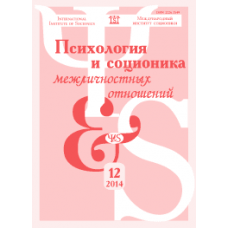Номер № 12/2014 журналу «Психологія та соціоніка міжособових відношень»
Психологія особистості
Погодин І.А.
Про деякі важливі категорії діалогово -феноменологічної психотерапії
У роботі зроблено аналіз найважливіших для діалогово-феноменологічного підходу у психотерапії категорій: гештальт, валентність, self-парадигма та переживання. При цьому розлучаються поняття «фігура» та «гештальт», під останнім мається на увазі деяка цілісна ситуація, що об'єднує фігуру і фон, а також особливості їх взаємодії. У процесі аналізу концепції валентності запроваджуються додаткові поняття природної та примусової валентності. Уточнюються та доповнюються поняття self-парадигми та переживання, дефініції яких дано у більш ранніх роботах.
Ключові слова: діалогово-феноменологічний підхід у психотерапії, фігура, фон, гештальт, природна та примусова валентності, поле, self-парадигма, переживання, властивості контакту.
Інтертипні відносини
Ципін П.Є.
Енциклопедія відносин
Докладно, з використанням інформаційної моделі психіки та знаків функцій, описані соціонічні типи. Проаналізовано всі інтертипні відносини, описано їх особливості.
Ключові слова: соціоніка, тип інформаційного метаболізму, модель А, інтертипні відносини.
Трубочкіна А.Є.
Особливості дзеркальних відносин у шлюбі
Обговорюються питання застосування соціоніки у сімейних відносинах між подружжям, побудови сімейних відносин, враховуючи знання соціоніки, а зокрема моделі А, алгебри та геометрії людських відносин. Наведено приклади взаємодії двох ТІМів, розглянуто загальні точки дотику, позитивні та негативні приклади спілкування.
Ключові слова: соціоніка, модель А, соціонічні аспекти, інтуїтивно-логічний екстраверт (IL, ІЛЕ), логіко-інтуїтивний інтроверт (LI, ЛІІ, алгебра інтертипних відносин, дзеркальні відносини.
Проблеми освіти
Серпіонова Є.І.
Облік потреб та особливостей учнів-етиків у викладанні
Викладено авторський досвід використання соціоніки у викладацькій роботі зі старшокласниками, особливо – етичних типів особистості. Показано, як правильна мотивація учнів стимулює їх до активної дослідницької роботи та до участі в різних конкурсах.
Ключові слова: соціоніка, психологія, педагогіка, школа, тип особистості, етика, виховання, мотивація, здібності. інтертипних відносин
Пропонується початківцям вивчати соціоніки новий спосіб полегшити осмислене запам'ятовування Таблиці інтертипних відносин В. Ляшкявічюса. Він базується на попередньому вивченні групи інтертипних відносин «квадра» та темпераментної групи. Інші інтертипні відносини розглядаються як твори вже відомих.
Ключові слова: соціоніка, інтертипні відносини, квадра, темпераментна група, оператор інтертипних відносин, Темпераментно-клубна таблиця множення операторів інтертипних відносин, Темпераментно-квадрова таблиця множення операторів інтертипних відносин.
Інтерв'ю
Шульман Г.А., Борисова В.С.
«Але кожна людина тобі вчитель…»
Інтерв'ю Г.А. . Шульмана про соціоніку як науку про людину.
Ключові слова: соціоніка, психологія, міжособистісні відносини.
Психологічний практикум
Амірова Є.А.
Про Королів, Пажів, Лицарів і Дам
Стаття присвячена розбору теми: «Символьна соціоніка». Завдяки складеним таблицям легше орієнтуватися в діагностиці ТІМу.
Ключові слова: соціоніка, Дами, Королі, Лицарі, Пажі.
Соціонічний практикум
Сащикова Л.М.
Мови кохання та соціонічні типи
У статті розглянуто види потреб у коханні, а також те, як можна використовувати соціоніки для допомоги собі чи комусь іншому в цій шляхетній справі. Розібрано вплив розташування соціонічних функцій моделі А на запити любові стосовно соціонічного типу етико-інтуїтивний екстраверт (ET, ЕІЕ). За основу взято роботу Гері Чепмена «П'ять мов кохання».
Ключові слова: соціоніка, тип інформаційного метаболізму, сильні функції, слабкі функції, інтертипні відносини.
Психологія та соціоніка 12/2014
- Модель: выпуск журнала «Психология и соционика…»
-
$3.00
- Ціна в бонусних бали: 30

